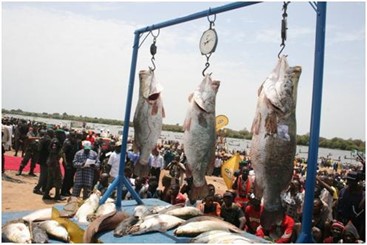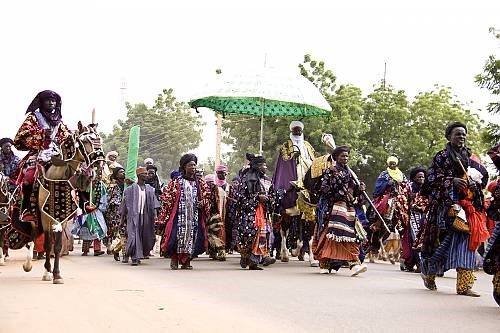The Argungu International Fishing and Cultural Festival, popularly referred to as the Argungu Fishing Festival, is held over four days between February and March every year. The Kebbawa people of Argungu are fishermen and farmers, rice being the main crop grown. After the rice is harvested, the fishing begins, and the festival takes place.
History
The Emir of Kebbi in Argungu and the Sultanate of Sokoto had been against each other for over a hundred years. However, a simple gesture of diplomacy changed the course of history. In 1925, Mallam Hassan Dan-Mu’azu, the District Head of Dange, learned from his subjects that the twentieth Emir of Argungu had set up camp on the outskirt of his district headquarters. He was on a journey to Kaduna and decided to lodge there for the night. In a show of diplomacy, Mallam Hassan Dan-Mu’azu decided to visit the Emir and pay his respects. It was testified that this visit led to a strong bond of friendship between the two leaders.
In 1931, Mallam Hassan became the 16th Sultan of Sokoto, and in 1934, he decided to revisit the Emir of Argungu. To honor him, the Emir of Argungu organized a grand reception culminating in the staging of the now centuries-old fishing festival. The Emir died shortly, and he was succeeded by his first son, Muhammadu Saani. Immediately after his coronation, the new Emir of Argungu decided to return the visit of the Sultan, which his father, unfortunately, could not do. During the visit, both rulers realized that the Sultan’s initial visit and the grand fishing event where they made a public appearance had unexpected benefits. It played a vital role in reducing tensions and decreasing the cross-border raids between their neighboring communities.
Location
The festival takes place at Argungu town in Kebbi state, the north-west geopolitical zone of Nigeria. The town is on the Sokoto river and is the seat of the Argungu emirate. It is held at four venues within Argungu; the Kabanci for the aquatic cultural activities, the township stadium for agricultural exhibition, and the grand fishing at Matan Fada river, which is about 50 metres wide and 50 feet deep.
Religious Rites
The religious rites associated with the festival are regarded as its essence, for through them prayers are offered to gods and ancestors for protection and prosperity. The rites, primarily the sacrifice of a goat, hens, fruits, and vegetables, are performed by the Homa, Sarkin, Ruwa, and Jirgi at the Sokoto river the day before the festival starts.
Cultural Activities
Before the fishing starts, an impressive display of aquatic cultural activities takes place - canoe race, swimming on a gourd and with a clay pot balanced on the head, diving competitions, wild duck hunting, fishing with bare hands, and water relays. Wrestling and boxing competitions, archery, motor rally, arts and crafts and agricultural exhibitions, local music, and dance troops are non-aquatic cultural activities.
Grand Fishing
The major event, which is the fishing competition, takes place on the fourth and final day of the festival and lasts for an hour. The Homa signals the start of the competition, after which thousands of fishermen dive into the river to hunt for the biggest fish. The use of modern fishing equipment is not allowed; thus, traditional nets and gourds are used. After that, singers rent the air with traditional Kebbawa rhythms. Another sect rattles huge gourds filled with seeds to drive the fish to shallow waters.

Ten-year Hiatus
The festival was suspended in 2009 due to insecurity in the northwestern states of Nigeria and did not take place for ten years. However, it resurfaced in 2020, displaying newer glory and hosting the Executive President of Nigeria.
Relevance
In 2016 the festival was inscribed on the UNESCO Representative List of the Intangible Cultural Heritage of Humanity in recognition of its being a heritage of ‘outstanding universal value’ that ought to be preserved for present and future generations.
The festival is important for conserving the fish in the Matan Fada river, thus ensuring the economic viability of the community’s fishery. The religious rites associated with the festival are also considered a celebration of life.
Local legends about the festival
The Argungu Festival comes with its share of mystery and supernatural events. The custodian of the Matan Fada River is called Hussaini Makwashe or Dangalidaman Makwashe (doubles as the Sarkin Ruwa: river fishing official). Until he okays the commencement of the festival, no one can catch any fish in the river. The fishes reportedly remain invisible to fishermen until the Hussaini Makwashe invites the fishes to the festival. A month before the festival, invitations are extended to fishes in other rivers connected to the Matan Fada River. They must arrive early before the competition else; they will not be allowed to partake in the competition. The Makwashe is also in covenant with the crocodiles in the river. A day before the fishing festival, he directs them to hide until it is over.

Tourism
The Argungu Festival is one of the tourist events not just in the north but in Nigeria as a whole. It attracts thousands of guests from all over the world, thereby being a significant source of foreign exchange. It further boosts the hospitality industry in Kebbi state. The tourism importance of this festival was felt when it was suspended, but its reemergence signifies prosperity for Nigeria, Kebbi state, and Argungu town.
Sources
Daily Trust
Refined NG
MBBA Global
Pressreader
UNESCO

